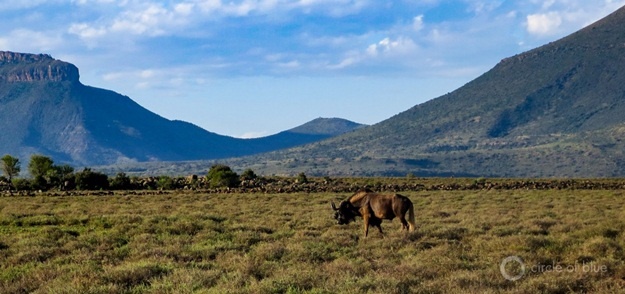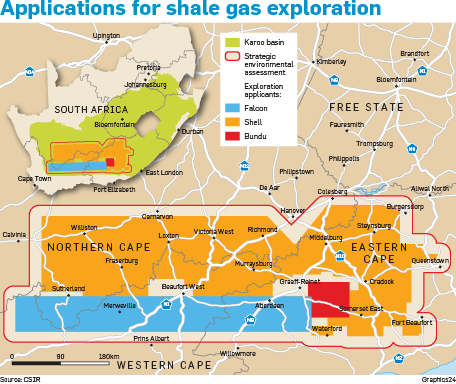
Exploration of shale gas in the Karoo will only create about 2 575 direct job opportunities – and that only if a large extractable gas strike is found.
For the local community, this means between 390 and 900 unskilled and semi-skilled job opportunities, according to an estimate by the Council for Scientific and Industrial Research (CSIR) in its report on shale gas exploration.
In addition, “it cannot be accepted that indirect job opportunities will reach the same levels as direct job opportunities”, says the report.
According to proponents of exploration of shale gas through fracking, one of the benefits of doing it is job creation.
Saliem Fakir, head of environmental organisation World Wide Fund for Nature SA’s Living Planet unit, reckons the possibility of jobs being created is “highly overestimated”.
These job opportunities are only a fraction of the opportunities available in other sectors.
According to Stats SA’s latest statistics, the mining sector, for instance, offered about 473 000 jobs in the first quarter of this year.
Although Fakir opposes the exploration of shale gas, he welcomes this scientific estimate and says it shows government is trying to handle the process “as openly as possible”.
The CSIR coordinated the estimation with the SA National Biodiversity Institute and the Council for Geoscience, and harnessed the work of 135 independent scientists. It was launched in February 2015 and the public has until July 15 to comment.
The area taken into account in the research is the part of the Karoo where there are five exploration applications pending – three by Shell, one by Falcon and one by Bundu.
The area covering 171 811 km² includes 27 municipalities.
On the one hand, it is argued that shale gas will bring an end to South Africa’s energy woes and create jobs.
On the other, it is argued that it will cause an environmental catastrophe.
According to the CSIR report, the amount of shale gas and whether there is enough to make it economically viable to extract are unknown.
The only way to find out is to start with exploration, and that will include hydraulic fracturing, or fracking.
Fracking entails drilling through underground rock until the rock breaks so that the gas that is trapped inside the rock can escape and be captured.
Millions of litres of water is used in this process.
According to the report, every borehole that is hydraulically fractured needs between 6 million cubic metres and 15 million cubic metres of water (15 billion litres).
Experts point out that shale gas exploration is not viable because of the low oil price.
The price of Brent crude is currently just less than $50 (R740) per barrel.
In the US, only a few shale-gas plants break even when the price is $50 per barrel, according to data from news agency Bloomberg.
Most only start breaking even at $70 per barrel. There are even plants where they only break even when the price reaches $160 per barrel.
Profitability in South Africa will depend on how much (if any) shale gas is found, as well as how deep underground it is – this will influence how expensive it will be to extract.
According to the report, a “small gas” development in South Africa will be regarded as one with about 5 000 billion cubic feet of gas (that is 5tcf).
A gas power station of 1 000 MW could be built from that.
“Big gas” is when a gas strike of 20tcf is developed. Two gas power stations of 2 000MW each and a gas-to-fuel plant at the coast that can produce 65 000 barrels of fuel daily could be built from such a find.
However, Fakir warns that the economic situation will change in the two decades it could take to eventually start shale exploration.
Johan Muller, programme manager for energy and environment at Frost & Sullivan, says although the country could benefit economically from exploration of shale gas – if the correct approach is followed – the unstable market conditions make it “dangerous” to attempt large capital projects such as this.




 Publications
Publications
 Partners
Partners









